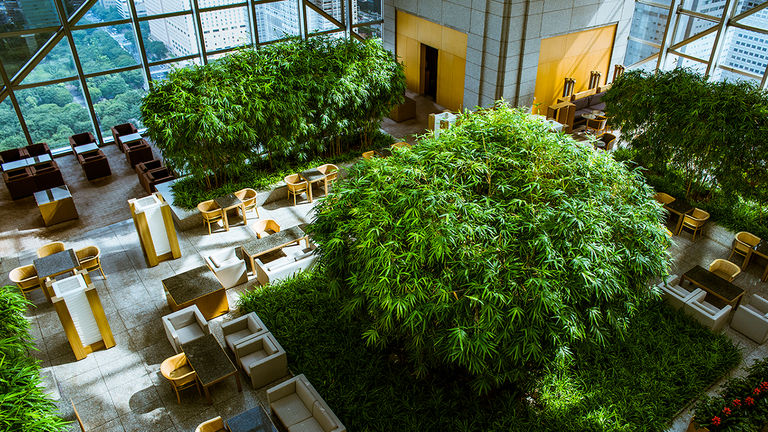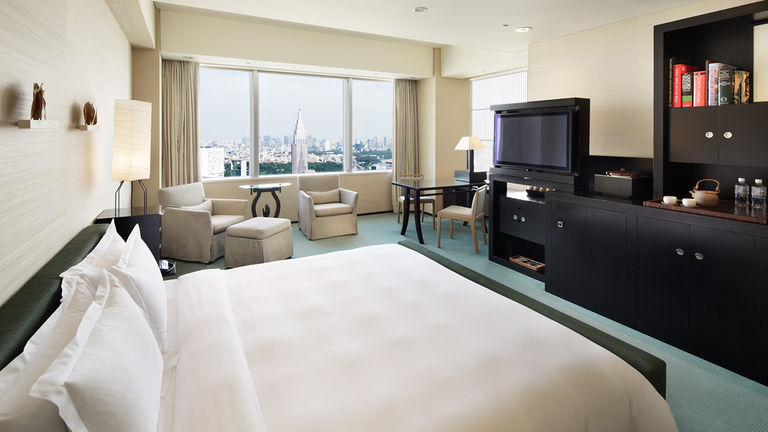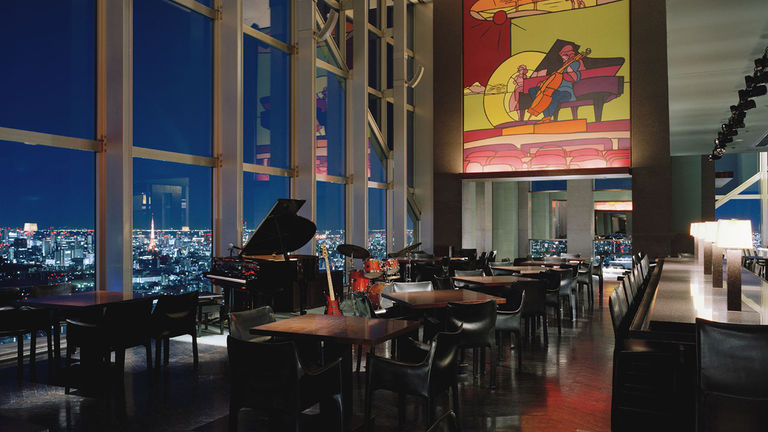When American movie star Bob Harris (played by actor Bill Murray) walked through the entrance of Park Hyatt Tokyo in the 2003 Academy Award-winning film “Lost in Translation,” viewers were transported right into the heart of the hotel, a luxurious Tokyo mainstay that’s elegantly perched at the top of the 52-story Shinjuku Park Tower.
In fact, the property was arguably as much a star in the film as Harris and his love interest, Charlotte (played by actress Scarlett Johansson), with its port-cochere, guestroom, bars and lounges acting as the main backdrop for the duo’s story.
During my flight from Los Angeles to Tokyo, I re-watched “Translation,” eager to see if the property’s guestrooms (some of the most spacious in Tokyo), panoramic city views, overall ambiance and VIP service stacked up to what I could only imagine was a result of a flick of director Sofia Coppola’s magic Hollywood wand.
But low and behold, what I experienced during my stay was nothing short of movie-star treatment. Even 20 years after the film’s debut — and just prior to its 30th anniversary — Park Hyatt Tokyo remains just as buzzy and alluring as ever.
And travelers have more to look forward to if they plan stays in 2025 and beyond: A top-to-bottom renovation is scheduled to take place from May 7, 2024, to the second quarter of 2025, which will blend designer John Morford’s original vision with unique, modern-day enhancements.
 Guests will recognize the “garden in the sky” Peak Lounge from the 2003 film.
Guests will recognize the “garden in the sky” Peak Lounge from the 2003 film.
Credit: 2023 Park Hyatt TokyoUpscale, VIP Service
Upon pulling up to the 177-room hotel’s front entrance, two employees — who greeted me by name — offered to assist with my luggage, before whisking me up to the 41st floor of the tower. I was then handed off to another staff member, who escorted me to my 592-square-foot Park Deluxe King guestroom for my own private, VIP check-in.
I didn’t stay in the room long, although I longed to make use of certain guestroom amenities; namely, the deep soaking tub, spacious walk-in closet and an extra-wide bed that was a welcome sight after a 12-hour international flight. The room itself was strikingly similar in design and function to that of “Translation’s” Bob Harris but, despite my visit coming just before the hotel’s upcoming renovation, it had held up surprisingly well.
 Park Hyatt Tokyo has a wide range of room categories; pictured here is a 592-square-foot Park Deluxe King guestroom.
Park Hyatt Tokyo has a wide range of room categories; pictured here is a 592-square-foot Park Deluxe King guestroom.
Credit: 2023 Park Hyatt TokyoA Thoughtful, Art-Forward Approach to Design
A full hotel tour was next on the agenda, where the scenes I saw play out on the screen came to life. The Peak Bar was our first stop; its bamboo “garden-in-the-sky” bar and lounge was illuminated by 50 washi paper lanterns reflecting in the room’s floor-to-ceiling windows, showcasing the hustle-and-bustle of Tokyo below.
My tour guide, Ms. Hitomi Onoda, a member of the property’s food and beverage team, pointed out small details I would have otherwise missed: the large metal masks perched over the hotel’s main entrance and at the top of the elevators, for instance; an autumn-colored tree made out of chocolate in the second-floor Pastry Boutique, which is helmed by executive pastry chef Julien Perrinet; the artist sketches tucked into the lamp posts of The Peak Bar; and many more.
 The New York Bar was featured in several scenes during “Lost in Translation.”
The New York Bar was featured in several scenes during “Lost in Translation.”
Credit: 2023 Park Hyatt TokyoOn-Site Restaurants, Lounges and Bars
We also meandered through the rest of the hotel’s restaurants: Delicatessen, a gourmet specialty shop that offers both dine-in and to-go options; the all-day French restaurant, Girandole, which is surrounded by a collage of 144 black-and-white photographs showcasing European cafe life; Kozue, a contemporary Japanese restaurant featuring dark woods and bamboo accents; and, for the grand finale, the 52nd-floor penthouse New York Grill and Bar, an open-kitchen-style restaurant and adjacent bar that serves menu items including Japanese Wagyu burgers, fresh-caught seafood, delicious Maine lobster rolls and more.
It was the New York Bar, which features live jazz music every evening and views of Mt. Fuji on a clear day, that captivated me toward the end of the night. I sat at the same high-top long table that fictional movie star Bob Harris returned to time and time again throughout the film, nursing his Suntory whisky.
Instead, I opted for a dirty martini, and surveyed the crowd. Like me, they seemed content — perhaps even honored — to be in such a setting, entranced by the soothing tones of the jazz quartet and dazzled by Tokyo’s glittering lights below.
Park Hyatt Tokyo’s Upcoming Renovation
Travelers should note that Park Hyatt Tokyo will be closed beginning May 7, 2024, until the completion of its renovation (set for the second quarter of 2025).
Tied to the hotel’s 30th anniversary, the renovation will feature the design of Jouin Manku, an agency representing the designer-architect duo Patric Jouin and Sanjit Manku.
More details regarding the renovation and a construction timeline will be shared closer to the renovation’s start date.